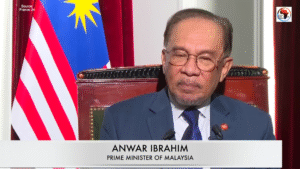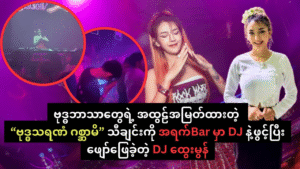By MMNN Desk: DARZKKG

In Myanmar’s long and painful history of communal division, it is rare to hear Buddhist monks publicly express solidarity with Muslim victims of violence. Yet one such voice has emerged with both moral clarity and boundless compassion: Ven. Sandadhika of Shwe Parami Tawya Monastery.
From Outstanding Student to Monkhood
Before he donned the saffron robes, Ven. Sandadhika was known as Maung Zaw Thein, a brilliant student at Basic Education High School (1), Yenangyaung.
In 1984, he won the Triple Outstanding Student Award (Thone Thap Kwun) for his excellence in academics, character, and service. Having achieved this distinction multiple times, he qualified for the prestigious Outstanding Students’ Camp, that year held in Mon State.
A fellow participant recalled:
“Although younger than me, Maung Zaw Thein already stood out for his purity and noble character. He truly lived up to the meaning of being an Outstanding Student.”
Later, he chose the monkhood over medicine or other worldly paths—a decision that would define his legacy.
The Historic Speech at Meiktila
On April 1, Ven. Sandadhika visited Muslim survivors of the Meiktila massacre and delivered words that no other senior monk in Myanmar had ever dared to speak:
“In samsara, there is no one who has never been our relative. The Muslims who are suffering today are also my own parents, brothers, sisters, and kin.
Because my relatives are suffering, I cannot just stand by and do nothing—that is why I came to give encouragement.
The material things I offer may be little, but the loving-kindness (mettā) from my heart is boundless. From the very beginning until now, I have been radiating mettā every second of this journey.
When monks at Lapaung Taung monastery suffered arson, I felt it deeply. And when Muslims in Meiktila were attacked for their religion, I felt it in exactly the same way.
Whatever has happened, I ask for forgiveness on behalf of all Buddhists.
True mettā is without boundaries. It should not be limited by religion or by race.”
Muslim Reflections on His Words
One Muslim scholar who reflected on his speech admitted:
“If we had not known the essence of Islam—or if Islam did not exist—I am certain that because of this Sayadaw, some Muslims would have embraced Buddhism.”
“If ever I hear a Muslim insulting a monk, even once, I would slap his face with my sandal. Because if we want to receive mettā, we must also show mettā. This Sayadaw is like perfume and sandalwood oil—rare and precious.”
Why His Words Matter
In a country where extremist voices have too often drowned out compassion, Ven. Sandadhika’s message is historic.
It reminds us that the true strength of a religion is not in dominating or harming others, but in extending compassion across all boundaries. Suppression and violence can never preserve a faith—they only destroy it from within.
For the Muslim victims of Meiktila, his speech was a river of cool compassion. For Myanmar as a whole, it was a reminder that genuine interfaith harmony is still possible.
Ven. Sandadhika, once an Outstanding Student, has now become an Outstanding Monk of Conscience—a beacon for Buddhists, Muslims, and all who seek truth and justice.
(Credit: Zaw Min and LYC colleagues)





